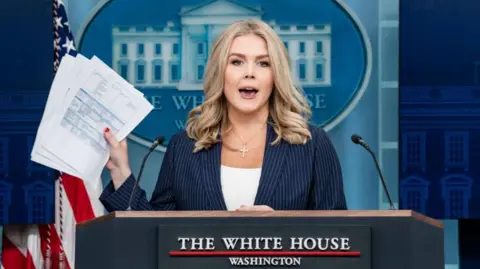US court orders White House to restore access for AP journalists
 Getty Images
Getty ImagesA US judge has ordered the Trump administration to restore the Associated Press's access to presidential events after the White House blocked the news agency in a dispute over the term "Gulf of America".
District Judge Trevor McFadden on Tuesday said the administration's restriction on AP journalists was "contrary to the First Amendment", which guarantees freedom of speech.
The dispute arose when the AP refused to adopt the administration's renaming of the Gulf of Mexico to the "Gulf of America" in its coverage, following an executive order by President Donald Trump.
The ban has meant that the AP has been unable to access press events at the White House as well as Air Force One.
Judge McFadden, who was appointed by Trump during his first term, also paused the ruling's implementation until Sunday to allow administration's lawyers time to appeal.
"The Court simply holds that under the First Amendment, if the Government opens its doors to some journalists — be it to the Oval Office, the East Room, or elsewhere — it cannot then shut those doors to other journalists because of their viewpoints," he wrote in his ruling. "The Constitution requires no less."
The AP had argued that the administration violated the news agency's constitutional right to free speech by restricting access due to disagreements over language.
In February, Judge McFadden had declined to immediately restore its access to presidential events.
After Tuesday's ruling, AP spokeswoman Lauren Easton said the agency was "gratified by the court's decision".
"Today's ruling affirms the fundamental right of the press and public to speak freely without government retaliation. This is a freedom guaranteed for all Americans in the US Constitution," she said in a statement.
Shortly after the judge's ruling, though, two AP journalists were turned away from covering an event that Trump attended on Tuesday night, the agency reported in an update on Wednesday.
A photographer and reporter were blocked from blocked from joining Trump's motorcade that was traveling to a dinner held by the National Republican Congressional Committee, the agency reported.
The ruling was also welcomed by other organisations who had criticised the initial restrictions on the AP.
"This is a careful, well-reasoned opinion that properly describes the exclusion of the Associated Press from the press pool as retaliatory, viewpoint-based, and unconstitutional," said Jameel Jaffer, the executive director at the Knight First Amendment Institute at Columbia University.
The AP sued three senior Trump administration officials — Press Secretary Karoline Leavitt, Chief of Staff Susie Wiles, and Deputy Chief of Staff Taylor Budowich — claiming the restrictions were unlawful and infringed on press freedom.
The Trump administration argued that the Associated Press was not entitled to "special access" to the president.
Soon after taking office in January, the Trump administration issued an executive order renaming the Gulf of Mexico to the "Gulf of America", a move the White House said reflects the gulf's status as "an indelible part of America".
The AP said it would continue to use the term Gulf of Mexico, while acknowledging the Trump administration's efforts to rename it.
In response, the White House restricted the AP's access to events covered by the "pool" of journalists who report back to other media outlets.
Trump has targeted several US media outlets since his return to office, including shuttering the government-funded Voice of America network, which was set up during World War Two to counter Nazi propaganda, and Radio Free Asia, a move that was welcomed by the Chinese government.
He has also threatened funding for public broadcasters NPR and PBS, saying the radio and tv outlets, which only receive a portion of their budget from the federal government, are biased against conservatives. Under his watch, the Federal Communications Commission has also opened lawsuits against the major networks ABC, CBS and NBC.
At the same time, his administration has opened up access to the White House for up-and-coming media, including newer networks that skew more conservative, as well as podcasters and social media influencers.
